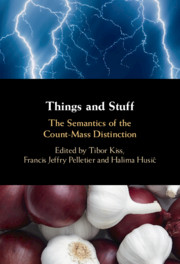Book contents
- Things and Stuff
- Things and Stuff
- Copyright page
- Dedication
- Contents
- Figures
- Tables
- Contributors and their Affiliations
- Preface
- 1 Editorial Introduction: Background to the Count–Mass Distinction
- Large-Scale Architectures for Count and Mass
- Implications from Individual Languages
- Compositional Analyses and Theoretical Issues
- 10 Ontology, Number Agreement, and the Count–Mass Distinction
- 11 The Semantics of Distributed Number
- 12 Container, Portion, and Measure Interpretations of Pseudo-Partitive Constructions
- 13 Overlap and Countability in Exoskeletal Syntax: A Best-of-Both-Worlds Approach to the Count–Mass Distinction
- New Empirical Approaches to the Semantics of the Count–Mass Distinction
- References
- Language Index
- Subject Index
12 - Container, Portion, and Measure Interpretations of Pseudo-Partitive Constructions
from Compositional Analyses and Theoretical Issues
Published online by Cambridge University Press: 21 May 2021
- Things and Stuff
- Things and Stuff
- Copyright page
- Dedication
- Contents
- Figures
- Tables
- Contributors and their Affiliations
- Preface
- 1 Editorial Introduction: Background to the Count–Mass Distinction
- Large-Scale Architectures for Count and Mass
- Implications from Individual Languages
- Compositional Analyses and Theoretical Issues
- 10 Ontology, Number Agreement, and the Count–Mass Distinction
- 11 The Semantics of Distributed Number
- 12 Container, Portion, and Measure Interpretations of Pseudo-Partitive Constructions
- 13 Overlap and Countability in Exoskeletal Syntax: A Best-of-Both-Worlds Approach to the Count–Mass Distinction
- New Empirical Approaches to the Semantics of the Count–Mass Distinction
- References
- Language Index
- Subject Index
Summary
We discuss the range of possible readings of the pseudo-partitive construction (henceforth PPC), such as (two) glasses/litres of milk. In particular, we discuss ‘container readings’, ‘contents readings’, ‘free portion readings’, and ‘ad hoc measure readings’. We argue against Partee & Borschev, 2012, who for Asher-style dot-types to accommodate co-predications of pairs of these readings, and propose mereology plus a simple type theory in a dynamic semantics. We also provide an analysis of at hoc measure PPCs and use this to explain why measure interpretations of PPCs where mass concepts are coerced into count concepts are hard to obtain.
Keywords
Information
- Type
- Chapter
- Information
- Things and StuffThe Semantics of the Count-Mass Distinction, pp. 279 - 304Publisher: Cambridge University PressPrint publication year: 2021
Accessibility standard: Unknown
Why this information is here
This section outlines the accessibility features of this content - including support for screen readers, full keyboard navigation and high-contrast display options. This may not be relevant for you.Accessibility Information
- 5
- Cited by
